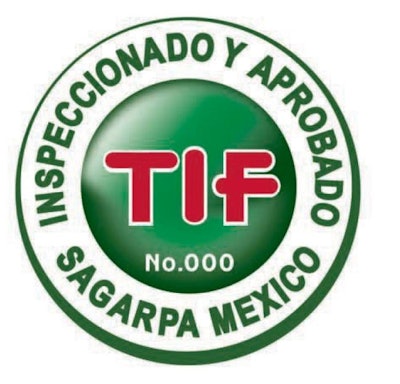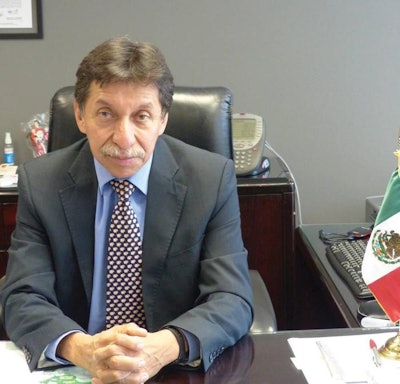The Federally Inspected Type (TIF) quality mark gives consumers of Mexican poultry products, at home or overseas, the guarantee that production has adhered to international standards.
Originally established more than 60 years ago, the TIF quality mark is becoming increasingly evident on Mexican poultry and other products of animal origin and guarantees that these products are world class.
TIF-accredited establishments are slaughter, processing and cold storage plants that are regulated, inspected and supervised by the country’s National Service of Health, Food Safety and Food Quality (SENASICA), part of the Secretariat for Agriculture, Livestock, Rural Development, Fisheries and Food (SAGARPA) and deemed to be in compliance with international standards
There are 137 TIF plants working in the poultry sector, and more plants working with other animal products.
TIF standards are in addition to Mexico’s national standards, and not all Mexican establishments are TIF accredited. In parallel, the country also has establishments that are regulated by the country’s Health Secretariat, rather than by the agricultural authorities.
These non-accredited plants can still be very good; it is simply that they work to different standards, explains Dr. Hugo Fragaso, SENASICA’s director general of agriculture, aquaculture, fisheries and food safety.
Basis of TIF standards
The international standards to which TIF establishments work come from two different bodies – the World Organisation for Animal Health (OIE) and the Food and Agriculture Organization of the United Nations’ Codex Alimentarius.
The codes of practice and standards coming from these bodies are not legally binding, but are adopted as standards by the World Trade Organization and recommended to its members.
Where international trade in meat is concerned, each country has rules and standards to protect its consumers, but additionally it will follow recommendations of the WTO.
The latter creates a framework in which trade can take place, and it is then up to each country to recognize those with which it wants to trade, either through “equivalence” or “recognition plant by plant.”
Guaranteeing independence under TIF
In the case of TIF-accredited establishments, the authorized veterinarian will have been approved by SENASICA and will be responsible for verifying all the processes that take place in the processing plant or other establishments, so guaranteeing the safety of products of animal origin.
Not all TIF-accredited plants supply the export market, however, and final destination of an establishment’s products will influence how this official veterinarian is paid.
Businesses that sell locally must directly pay the official veterinarian’s salary, while those that export pay the international regional body for livestock health (OIRSA), which then pays the veterinarian’s salary to prevent a conflict of interest.

The TIF logo is becoming increasingly recognized in Mexico and offers purchasers of TIF-marked products the guarantee that food has been produced to international standards.
TIF quality mark
Use of the TIF mark has been growing in Mexico and is increasingly recognized, with government funds being made available for its promotion. According to Fragoso, there is a growing desire to understand what it means and the advantages it brings.
Challenges of TIF
To be TIF certified means “not allowing situations to arise in the establishment that are outside of the TIF system,” explains Fragaso. Where food safety is concerned, “anyone who as decided to follow, cannot allow even a single error to occur,” he continues.
Adhering to TIF standards is not cheap, and for this reason many companies are yet to adopt them. There is not simply the cost of investing in compliant equipment, but also investment in teams and the maintenance of the system.
There are many slaughterhouses that, for example, do not have cold rooms. Under TIF, this is not permitted, as processed chickens must be kept in cold rooms or refrigerators. Investment in refrigeration is the most expensive part of TIF.
Additionally, companies must operate Hazard Analysis Critical Control Point (HACCP), which is expensive to operate and run. Additionally, resources must be found to pay for the authorized veterinarian as there is continual inspection.
The case of eggs
Mexico exports powdered eggs, liquid eggs and egg derivatives, such as lysozyme. There are four TIF-recognized plants in Mexico, two of which export.

According to Dr. Hugo Fragaso, SENASICA’s director general of agriculture, aquaculture, fisheries and food safety, Mexico has 137 TIF-accredited poultry, egg, hen and cold cut plants.
TIF- and non-TIF-accredited plants
There are three main differences that distinguish TIF from non-TIF plants.
- TIF plants must follow very specific rules, while non-TIF plants follow four general rules laid down by the Ministry of Health that all food producers in Mexico must follow.
- In TIF plants, there is a responsible veterinarian authorized by SENASICA, which requires very high standards. In non-TIF plants, there are Ministry of Health inspectors, who have been trained differently.
- TIF is voluntary, while Ministry of Health rules are compulsory.
The benefits of TIF accreditation
- Only TIF-accredited plants are allowed to export Mexican meat products.
- TIF-accredited plants are the only ones allowed to use the TIF mark, offering consumers a quality guarantee and greater faith in their purchase.
- TIF-accredited plants are allowed to sell to members of the retail association ANTAD. Any supermarkets affiliated to this group will not buy chicken from plants that are not accredited. Normally, these shops have a TIF-certified cold store to receive meat products from Mexico and overseas, in which there is a SAGARPA-accredited veterinarian.
- If a supermarket buys imported poultry products, it will want the country of origin health certificates to guarantee safety, and these are collected in the TIF cold store.
To read the original version of this story, go to:
















